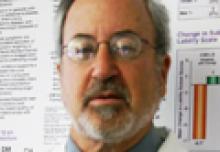VANCOUVER—An approved drug for pseudobulbar affect also relieves speech, swallowing, and salivation difficulties in patients with amyotrophic lateral sclerosis (ALS), according to phase II trial results presented at the 68th Annual Meeting of the American Academy of Neurology.
"To our knowledge, this is the first controlled study to report an improvement of any function in ALS--specifically, the enhancement of speech and swallowing and improved ability to handle oral secretions," said Richard A. Smith, MD, a neurologist at the Center for Neurologic Study in San Diego, and colleagues. Bulbar symptoms are a serious and disabling consequence of ALS, the researchers said.
Richard A. Smith, MD
The FDA approved the drug, a combination of dextromethorphan hydrobromide and quinidine sulfate, for pseudobulbar affect in 2010. Some patients with ALS who received the drug(marketed as Nuedexta) for pseudobulbar affect found that that the drug appeared to improve their speech, swallowing, and salivation as well.
To evaluate the effect of the drug on bulbar function in patients with ALS, Dr. Smith and colleagues conducted a multicenter, double-blind, randomized crossover trial. Investigators enrolled 60 subjects from seven sites. Participants were at least 18 years old with a diagnosis of probable or definite ALS, disease duration of less than two years from diagnosis, and bulbar dysfunction manifested by dysarthria or dysphagia. A score of 50 to 80 on the Center for Neurologic Study-Bulbar Function Scale (CNS-BFS) confirmed patients' bulbar dysfunction.
During the trial, participants received active treatment or placebo for 28 days. Then, after a 10- to 15-day washout period, participants completed the opposite treatment condition for 28 days. For the first seven days of each treatment period, subjects were instructed to take one capsule of placebo or active drug in the evening. Subsequently, they were instructed to take one capsule every 12 hours for the remainder of the treatment period.
CNS-BFS, a 21-item self-report scale that assesses the domains of speech, swallowing, and salivation, was the primary outcome measure. Treatment "unequivocally improved" this outcome, Dr. Smith and colleagues said. Patients' average CNS-BFS score was 53.45 on active treatment, compared with 59.31 on placebo, a highly significant difference of 5.86, the researchers said.
The difference for each subdomain of the scale also was highly significant. Other secondary outcome measures included change in the rater-administered revised ALS Functional Rating Scale (ALSFRS-R), self-administered Visual Analog Scale (VAS) for bulbar function, the Ashworth spasticity scale, the timed reading of a test paragraph, timed swallowing of solids and liquids, and an observed salivation assessment. The investigators observed statistically significant improvements on the VAS speech scale and the bulbar component of the ALSFRS-R. In addition, patients with and without pseudobulbar affect responded to the treatment. The results warrant confirmation in a phase III trial, the investigators concluded.
—Jake Remaly


